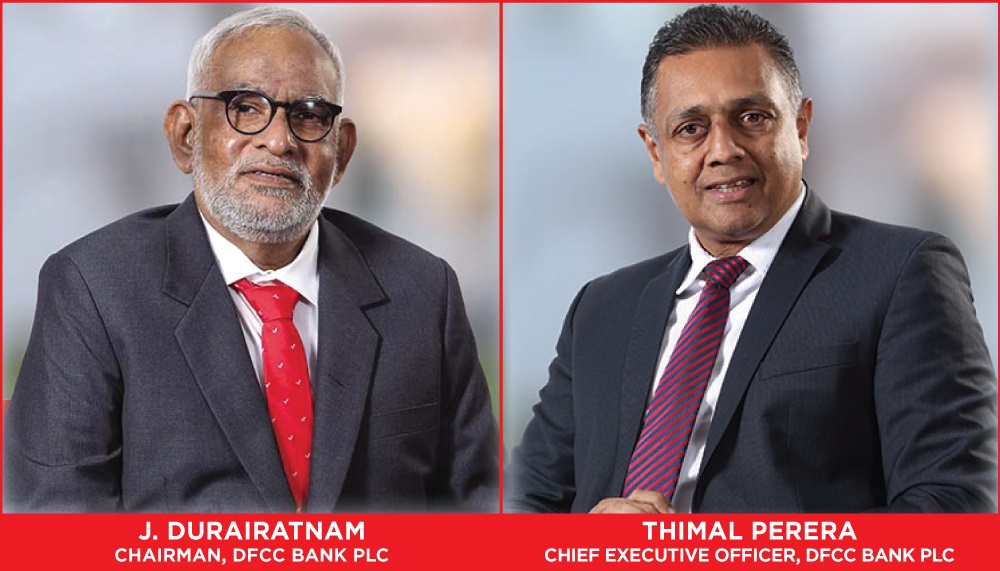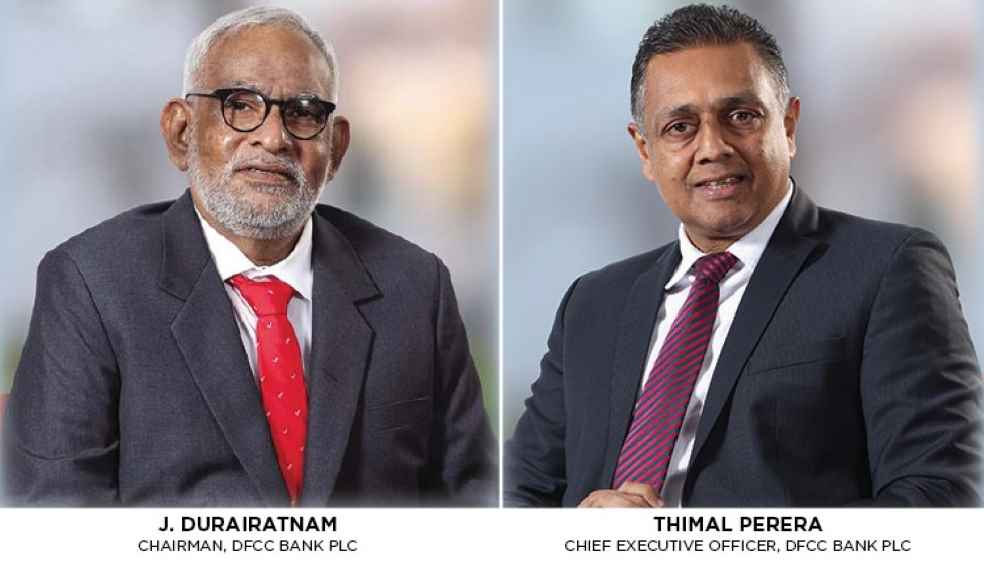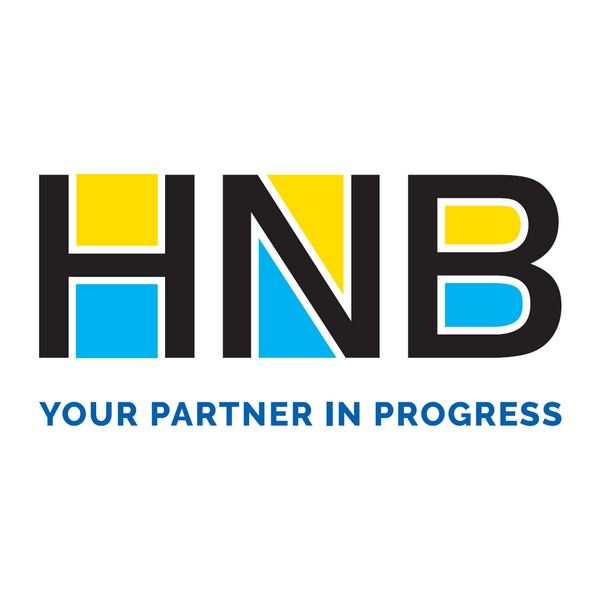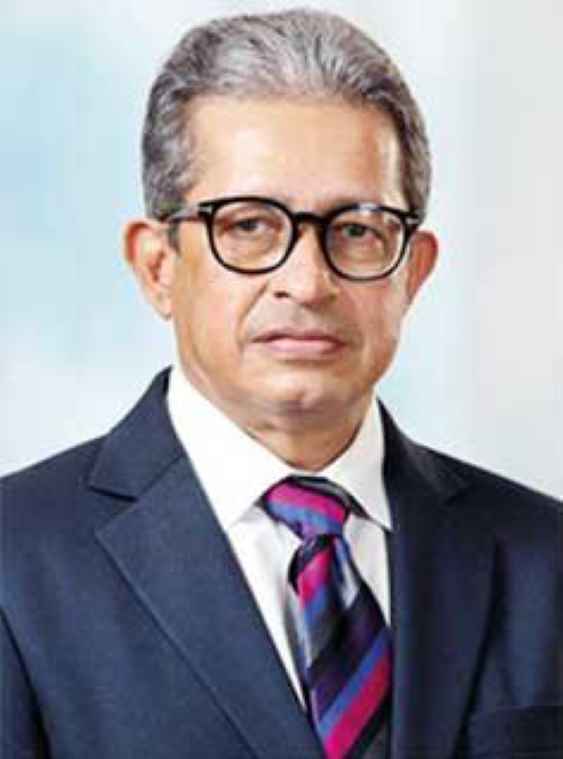- Group Total operating income up by 43% to LKR 31 Bn
- Group records Operating Profit Before Taxes on Financial Services of LKR 11 Bn.
- Group PAT of LKR 7 Bn
- Impairment charge of LKR 12 Bn reflective of present economic stresses
During the period under review, DFCC Bank remained committed to providing high-quality, customer-centric banking services across the country despite facing unprecedented challenges that affected the banking industry. As a result of this dedication, the Bank has recorded a strong performance for the Q3 of 2023.
The Central Bank of Sri Lanka’s (CBSL) timely policy rate relaxation has enabled downward adjustments to the historically high-interest rates, and improved economic conditions would help boost credit flows to the economy in the period ahead. Meanwhile, a reduction was also observed in the yields on government securities with falling risk premia following the finalisation of the debt treatment on rupee-denominated instruments under the domestic debt optimisation (DDO) programme.
The Bank has aligned with the CBSL guidelines and reduced lending and deposit rates to pass the benefits of the continued easing of monetary conditions to individuals and businesses adequately and swiftly, thus supporting the envisaged rebound of the economy.
The following commentary relates to the unaudited Financial Statements for the period ended 30 September 2023, presented in accordance with Sri Lanka Accounting Standard 34 (LKAS 34) on “Interim Financial Statements”.
Financial Performance
Profitability
DFCC Bank PLC, the largest entity within the Group, reported an Operating Profit Before Taxes on Financial Services of LKR 10,693 Mn, Profit Before Income Tax (PBT) of LKR 8,305 Mn and a Profit After Tax (PAT) of LKR 5,498 Mn for the period ended 30 September 2023. This compares with an Operating Profit Before Taxes on Financial Services of LKR 2,269 Mn, PBT of LKR 1,420 Mn and a PAT of LKR 1,043 Mn in Q3 of 2022. The Group recorded an Operating Profit Before Taxes on Financial Services of LKR11,069 Mn, PBT of LKR 9,938 Mn and PAT of LKR 7,064 Mn for the period ended 30 September 2023 compared to 2,612 Mn, LKR 1,762 Mn and LKR 1,320 Mn, respectively, in 2022. All the member entities of the Group made positive contributions to this performance. The Bank’s Return on Equity (ROE) increased to 11.66% during the period ended 30 September 2023 from 5.04% recorded for the year ended 31 December 2022. The Bank’s Return on Assets (ROA) before tax for the period ended 30 September 2023 is 1.76% compared to 0.46% for the year ended 31 December 2022.
Net Interest Income
The Bank’s Net Interest Income (NII) increased 26% over Q3 of 2022 to reach LKR 23,655 Mn by the end of September 2023. Both deposit and lending interest rates have continued to adjust downwards with the broader guidelines provided by the Central Bank in line with the relaxed monetary policy stance of the Central Bank. Accordingly, the Bank has reduced both lending and deposit rates to pass on the benefits of the continued easing of monetary conditions to individuals and businesses adequately and swiftly, thereby supporting the envisaged rebound of the economy. While lower interest rates may have resulted in reduced interest income and expenses, in nominal terms, Net Interest Income (NII) has continued to improve as a metric during the period under review as a result of the Bank’s strategy of investing in high-yield government securities.
Strategically, the Bank thus increased its fixed-income investment portfolio, contributing significantly to increased interest income. The interest margin increased from 4.95% in September 2022 to 5.45% by September 2023.
Fee and Commission Income
The Bank’s dynamic strategies and the efforts of its dedicated teams led to increased remittances, trade-related commissions, and other fee income lines, which contributed to the increase in non-funded business during the period. Fee income generated by credit cards also increased significantly, in line with the volume of the transactions. Accordingly, net fee and commission income have increased by 40% to LKR 2,848 Mn for the period ended 30 September 2023, compared to LKR 2,031 Mn for the comparative period in 2022.
Impairment Charge on Loans and Other Losses
The impaired loan (stage 3) ratio increased from 4.36% in December 2022 to 6.13% as of 30 September 2023, continuing the prevalent trend amidst the present economic conditions. However, the Bank expects this trend to moderate and potentially improve towards the end of the year, reflecting positive developments in the macroeconomic environment coupled with the Bank’s concerted efforts regarding recoveries. To address the current and potential future impacts of the present economic conditions on the lending portfolio, the Bank made adequate impairment provisions during the period by introducing changes to internal models to account for unseen risk factors in the present highly uncertain and volatile environment, including additional provisions made for the Bank’s exposure to risk elevated sectors.
The Bank has used significant judgment using the information available at the reporting date to estimate the recoverable value of foreign currency-denominated investment securities issued by the Government of Sri Lanka. Accordingly, an impairment charge has been recognised to maintain a provision cover of 45% on the above investments.
Accordingly, with these provisions to address the additional risks in the economic environment, the impairment charge recorded at LKR 12,113 Mn for the period ended 30 September 2023, compared to LKR 11,962 Mn in the comparable period.
Operating Expenses
Operating expenses for the period ended 30 September 2023 increased to LKR 8,370 Mn compared with LKR 7,382 Mn during the corresponding period in 2022, primarily due to the increase in inflation. However, the Bank has taken numerous cost control measures within the Bank, resulting in operating expenses being curtailed and managed at these levels.
Other Comprehensive Income
Changes in the fair value of investments in equity securities and fixed-income securities (treasury bills and bonds) and movement in hedging reserves are recorded through other comprehensive income. Due to the application of hedge accounting, the impact on the total equity of the Bank due to exchange rate fluctuation was minimised. A fair value gain of LKR 6,431 Mn was recorded on account of equity securities outstanding as at 30 September 2023. The increase in the share price of Commercial Bank of Ceylon PLC during the period was the main contributor to the reported fair value gain in equity securities. The favourable movement in treasury bills and bond yields also resulted in a fair value gain of LKR 3,239 Mn during the period.
Business Growth
Assets
Despite the challenges faced by the economy and the banking sector, DFCC Bank’s total assets increased by LKR 28.7 Bn, recording a growth of 5.07% from December 2022. In line with the Bank’s growth strategy and the present economic climate, an increase in investment in fixed-income securities, combined with positive fair value movement in both fixed-income securities and equity securities, has contributed to a 100% increase in investment in financial assets at fair value through other comprehensive income as of 30 September 2023 compared to the balance as of 31 December 2022. With increased provision for expected credit losses, appreciation of the Sri Lanka Rupee compared to 31 December 2022 and considerable economic challenges, the net loan portfolio was recorded at LKR 335 Bn as at 30 September 2023, which is 9% lower than the balance as at 31 December 2022.
Liabilities
The Bank’s deposit base experienced a growth of 5.75% during the period, recording an increase of LKR 21.3 Bn to LKR 392 Bn, up from LKR 370 Bn as at 31 December 2022. This resulted in recording a loan-to-deposit ratio of 96.98%. Further, the CASA ratio was 22.20% as at 30 September 2023. The Bank’s funding costs were also contained using medium to long-term concessionary credit lines, primarily used to grow the lending portfolio. Taking into consideration these concessionary term borrowings, the CASA ratio further improved to 33.12%, and the loans-to-deposit ratio improved to 83.37% as at 30 September 2023.
Equity and Compliance with Capital Requirements
DFCC Bank’s total equity increased to LKR 65 Bn as at 30 September 2023, supported by favourable movements in the equity portfolio and fixed income security portfolio classified as fair value through other comprehensive income, and positive movements in the hedging reserve, together with the recorded profit after tax of LKR 5.5 Bn. Accordingly, Tier 1 and Total Capital ratios improved to 11.090% and 13.722%, respectively, by 30 September 2023, compared to 10.085% and 13.148%, respectively, as at 31 December 2022. The Bank’s Net Stable Funding Ratio (NSFR) was 135.63%, and Liquidity Coverage Ratio (LCR) – all currency – was 463.22% as at 30 September 2023, compared to 126.55% and 202.34%, respectively, as at 31 December 2022. All these ratios were thus maintained well above the minimum regulatory requirement.
CEO’s Statement
“DFCC Bank’s strong performance in Q3 of 2023, as evidenced by a remarkable 43% increase in total group operating income, underscores our commitment to delivering exceptional banking services in challenging times. We’re optimistic about the future, thanks to the Central Bank’s supportive policies, lower interest rates, and improved economic conditions. While facing external challenges and ongoing economic stresses, our prudent strategies have led to a significant boost in profitability, growth in assets, and improved equity positions. We remain steadfast in our mission to navigate the volatile business environment and continue supporting our valued customers and the nation’s economy.”
Thimal Perera
Director / Chief Executive Officer
9 November 2023















